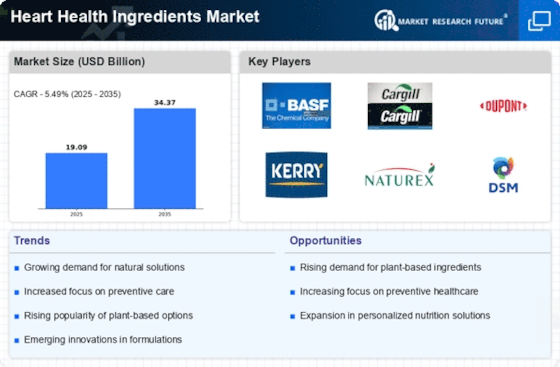Market Trends
Key Emerging Trends in the Heart Health Ingredients Market
The growing emphasis on adopting a healthy lifestyle is increasingly evident among consumers, driven by concerns about the proliferation of obesity, diabetes, and cardiovascular diseases associated with unhealthy living. Encouragingly, a shift towards healthy eating practices, often characterized by plant-based diets, is gaining traction. A plant-based diet typically advocates the consumption of whole, plant-based foods while discouraging the intake of meats, dairy products, eggs, and refined/processed foods. This dietary approach is propelled by various motivations, including animal welfare, environmental preservation, overall health considerations, and evolving taste preferences.
Consumers are becoming more attuned to the environmental impact and ethical implications of their lifestyle choices, prompting a significant uptick in the adoption of plant-based diets. Factors such as animal welfare, human health, and environmental consciousness have converged to propel the mainstream acceptance of veganism. Beyond personal health benefits, embracing a vegan lifestyle is associated with positive outcomes, including enhanced heart health, improved diabetes management, and lower obesity rates. Notably, countries like Israel, Sweden, Japan, Poland, the U.S., Germany, and the U.K. exhibit the highest concentrations of vegans.
The surge in veganism is further amplified by the prevalence of social media and the increased visibility of vegan celebrities. This has played a pivotal role in influencing people's dietary choices, emerging as a key driver behind the burgeoning vegan movement. Consequently, the escalating adoption of vegetarian and vegan diets is serving as a catalyst for the growth of the soy protein ingredients market.
The global soy protein ingredients market has witnessed significant expansions in product lines, driven by heightened research and development (R&D) activities and technological advancements. The landscape is marked by innovative product introductions, reflecting the evolving dynamics of the market. As the vegetarian population stabilizes globally, particularly in developed nations like the U.K., U.S., Germany, and France, food and beverage manufacturers are redirecting their focus towards diverse plant-based product options. Companies are actively avoiding animal ingredients wherever possible to broaden their appeal to consumers. Notably, even meat companies are diversifying their portfolios by introducing meat alternatives to cater to the growing vegetarian market segment.
Plant protein ingredients, including soy protein, are gaining widespread acceptance in the food application industry. These ingredients find applications in various segments such as bakery and confectionery, breakfast cereals, snacks, ready-to-drink (RTD) beverages, and ready-to-eat (RTE) and ready-to-cook (RTC) meals. Athletes and bodybuilders are increasingly turning to protein supplements, expanding the utilization of plant-based protein ingredients in the dietary supplements market.
The year 2020 witnessed a remarkable surge in new vegan product launches globally, underscoring the industry's commitment to continuous innovation. Esteemed brands such as Heinz, Hellman’s, Ben & Jerry’s, Quorn, and Dr. Oetker, along with popular eateries like KFC, Subway, Burger King, McDonald’s, TGI Fridays, Wagamama, and Pizza Hut, introduced a staggering 1,200 new vegan products. This influx of plant-based innovations is expected to contribute significantly to the robust growth of the global soy protein ingredients market in the foreseeable future.



















Leave a Comment